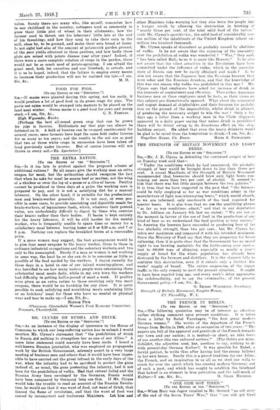MR. CLYNES ON RUSSIA AND DRINK.
[To THE EDITOR or THE " SPECTATOR.")
Sia,—As an instance of the display of ignorance in the House of Commons to which our long-suffering nation has to submit I would mention Mr. Clynes's statement that " the prohibition of drink in Russia did nothing to strengthen her as one of our Allies." A more false statement could scarcely have been made. I heard a well-known Russian journalist, who was employed on propaganda work by the British Government, solemnly assert in a very large meeting of business men and others that it would have been impos- sible to have carried out the great retreat in the early days of the war, when the infantry had to be sacrificed to protect the guns instead of, as usual, the guns protecting the infantry, had it not been for the prohibition of vodka. Had that retreat failed and the Russian Army been enveloped by the Germans, Russia would have been conquered by Germany long ere this. If Mr. Clynes would take the trouble to read an account of the Russian Revolu- tion, he would see that it was want of food, not want of drink, that fanned the flame of revolution, and that the want of food was caused by incompetent and traitorous Ministers. Let him and other Ministers take warning lest they also force the people into a hunger revolt by allowing the destruction in brewing a! " nearly three per cent. of the total solid food of the nation " (ride Mr. Clynes'a speech)—i.e., the solid food of considerably over one million of the inhabitants of the United Kingdom (about on million two hundred thousand).
Mr. Clynes speaks of discontent as probably caused by abolition of vodka. Is he not aware that the rejoicing of the peasantry over the prohibition of vodka was wonderful ? "War," they said, " has been called Hell; to us it is more like Heaven." Is he also not aware that the vilest atrocities in the Revolution have been committed under the influence of vodka, which in the anarchic state of Russia can now be easily obtained and made ? Is lie also not aware that the Japanese beat the Russians because they were sober and the Russians drunken, and that the knowledge of this was one reason why vodka was prohibited in this war ? Mr. Clynes says that employers have asked for increase of drink in the interests of contentment and efficiency. Then either American business men or these employers must be fools, as their views on this subject are diametrically opposed. What about the reiterated and urgent demand of shipbuilders and their foremen for prohibi- tion on the ground of the impossibility, whilst drink is allowed, of producing the necessary output to win the war ? Ouly a few days ago a letter from a working man in the Clyde shipyards appeared in a daily paper saying that unless drink is prohibited there will be defeat owing to its disastrous effect on the ship- building output. He added that even the heavy drinkers would be glad to be saved from the temptation to drink.—I am, Sir, &c.,


































 Previous page
Previous page